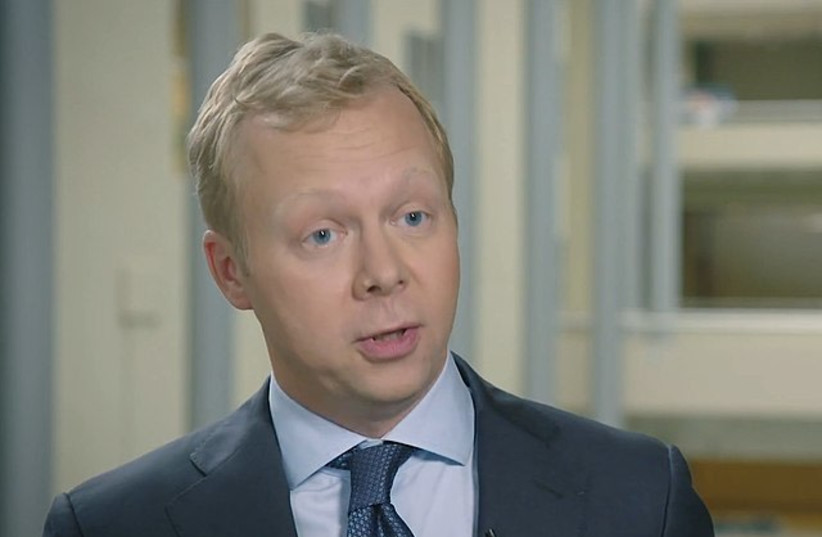BRUSSELS – The European Union intends to press for peace and reject Israeli moves to expand West Bank settlements, EU Special Representative for the Middle East Peace Process (MEPP) Sven Koopmans told Israeli journalists in Brussels on Tuesday as he dismissed Foreign Minister Eli Cohen’s call for the EU to cease criticizing Israel’s settlements and handling of the Palestinians.
Koopmans was responding to a question from journalists about whether he would back off following Cohen’s statement.
Looking perturbed, he said, “the conflict is an international conflict. There should be a peace agreement that includes many international partners– that is obviously an international solution. I represent the EU, which wants to contribute to that solution, working with everyone.
“I very much look forward to meeting the foreign minister and to discussing it with him,” he said.
Koopmans: EU needs a safe, secure Palestine alongside Israel
The EU official spoke as the Higher Planning Council for Judea and Samaria was scheduled to meet Wednesday and Thursday to advance plans for at least 6,000 new settler homes.

Appointed in May 2021, Koopmans has a background in conflict resolution in Ukraine, Kosovo, Mali and Sudan on behalf of the EU, the UN and the African Union. According to the MEPP chief, he has three main roles, the first of which is to “advocate, defend and elaborate the EU position on the Middle East Peace Process,” which has been “more or less the same since 1980.”
“We need peace and security, a safe and secure Israel living side by side with a safe and secure Palestine with Jerusalem as the capital of both states,” as well as some other parameters, he said.
“I try to bring together the EU and its various parts on concrete projects and initiatives,” Koopmans said. “The EU is not just by far the largest trade partner of Israel… we are also by far the largest donor to the Palestinians. We always want to strengthen ties with Israel and with the Palestinians where possible and within parameters.”
In addition, he said he does a lot of explaining to the EU’s 27 foreign ministers and member states about what underlies various phenomena developing within Israel and the Palestinian areas.
“Without pretending I have a veto right” over policy, he said that generally, he has “had more political support than my predecessor.”
But he said his third role was most important since “nobody else has it – and it is maybe the most distinctive: to actually try to advance or revive the peace process,” in a concrete way, as opposed to just explaining issues externally or internally within the EU.
“Yes, I am the EU leader for the peace process,” Koopsman said, but the problem is that, “frankly, there is no Middle East peace process. I have been asked by [EU Foreign Minister Josep] Borrell and the EU foreign ministers: Can the EU have a more substantive role in developing a peace process?”
“We believe in security and stability for Israel and the Palestinians in a future independent Palestinian state and for the whole region. That can only come about if there is actual and genuine peace,” he said, adding that too many officials get lost in the day-to-day fights over the latest killed Israeli or Palestinian or settlement announcement, instead of trying to drive toward a comprehensive solution.
He then asked the Israeli journalists present for ideas about how to move the peace process forward in a broader fashion.
During that exchange, Koopmans dismissed any discussion of possible EU support for a solution not based on the two-state framework.
Asked if the new government’s policies are an obstacle to peace, he responded: “I don’t use these words... My responsibility is to work with all of the parties in the conflict to try to get closest to peace, and ideally to actually achieve it.”
Regarding the latest Israeli settlements announcement, he said that “we have made it very clear, and Higher Representative Borrell made it very clear: the decision is itself an obstacle to peace.”
One specific strategy he discussed was working with regional Middle East partners to facilitate the conditions for peace and potentially convince the various sides to be more flexible.
He referred to a February 13 joint statement issued by the EU, the Saudis and the Arab League that supported peace negotiations and rejected Israel’s latest announcement regarding new settlement building.
Tovah Lazaroff contributed to this report.
